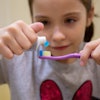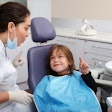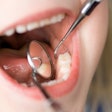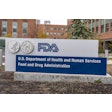
New research has called into question the effects of anesthesia on the brains of young children and sparked a call for greater understanding about potential long-term neurological consequences, according to an article in the New England Journal of Medicine (NEJM, March 9, 2011).
Studies in animals suggest that anesthetic drugs could harm neurologic and cognitive development in young children and neonates. A lack of data and difficulty in standardizing studies makes the dearth of information likely to be an ongoing problem, according to the authors. Some anesthesiologists believe that the existing evidence is enough to warrant added caution when considering general anesthesia in pediatric patients.
“It's definitely cause for concern for any anesthesiologist who treats children.”
— Steven Ganzberg, DMD, MS
"I think it's definitely cause for concern for any anesthesiologist who treats children," Steven Ganzberg, DMD, MS, a professor of clinical anesthesiology at Ohio State University, told DrBicuspid.com. "You're looking at behavior changes that take place over a lifetime, so I think the jury's going to be out. But my take is, if you have a young child and you think that the procedures that need to be done can be done without general anesthesia, I think that's worth considering."
The NEJM article cites a recent study by the National Center for Toxicology Research (NCTR, part of the U.S. FDA) that a dose of ketamine administered to 5-day-old rhesus monkeys for either 9 or 24 hours caused neuroapoptosis (Toxicological Sciences, July 2007, Vol. 98:1, pp. 145-158). No such result came from ketamine exposure over a 3-hour period.
"It appears that infants less than 1 have the greatest risk, but we don't know how much that risk decreases over the years and where the cutoff is going to be," Dr. Ganzberg said. "Clearly, for most of the kids getting dental treatment done, they're 3, 4, 5 years old. We do have some very young kids that are 18 months, and if the parents want to save their front teeth, then they're going to need anesthesia because an 18-month-old isn't going to sit for dentistry."
Concrete evidence needed
Studies performed in previous years testing the response of rodents to anesthetic agents during peak times of brain development produced "widespread neuronal apoptosis and functional deficits later in development," according to the NEJM article. While additional rodent studies could produce quick results, nonhuman primate studies would provide better cognitive testing. But the cost and length of time required to complete such studies are primary obstacles, the authors noted.
One cohort study of 383 children who had received inguinal hernia repair before the age of 3 found that they were twice as likely to be diagnosed with a developmental or behavior disorder than were the 5,050 children who served as a control sample (Journal of Neurosurgical Anesthesiology, October 2009, Vol. 21:4, pp. 286-291).
A population-based, retrospective, birth-cohort study that compared educational records and medical records of children who had received one, two, or more than two anesthetics found no increase in the frequency of learning disabilities in those who had received a single anesthetic (Anesthesiology, April 2009, Vol. 110:4, pp. 796-804). However, those who had received two or more had increased risk.
While these studies offer a degree of insight into the effects of anesthetics on developing brains, they are lacking in concrete evidence, the authors of the NEJM article stated.
"Many of these kids who have had anesthesia were a different set of kids versus your normal set of kids," Dr. Ganzberg explained. "They may have had underlying issues going on that would confound these studies. What we really need to do is compare groups of kids that had elective or semielective procedures with ones that had them delayed."
As information about the long-term effects of anesthesia trickles in, the way in which medical professionals determine the need for a procedure against the impact of anesthesia will change too.
"If you have a child with a mouthful of decay who is uncooperative or too young to cooperate, then you have to weigh the concerns regarding anesthesia and a low level of it -- because it's not a terribly invasive procedure -- versus restraining the child with a device and having them scream while you do dentistry on them and potentially developing a post-traumatic stress disorder or a severe dental phobia of some sort," Dr. Ganzberg said.
FDA still reviewing
Ghasem Ansari, DDS, MS, an associate professor of pediatric dentistry at Shahid Beheshti University in Tehran, Iran, and a practicing dentist who recommends general anesthesia for many procedures in children, believes that it is a safe alternative to the traumatic experience of undergoing procedures while restrained.
DrBicuspid.com spoke with Dr. Ansari about the subject at the recent International Association for Dental Research meeting in San Diego where he presented his study, "Parents' perception on general anesthetic dental treatment in Tehran, Iran." The mean age for the children was 4.27 years.
In that study, he found that 63% of parents would recommend general anesthesia to family members and that 70% would be willing to repeat the procedure if necessary. However, parents overwhelmingly felt that general anesthesia was a "backup plan" to other measures: "Parents ... expressed more interest on behavior management techniques as the first attempt to control and treat children," the researchers noted. Only 2% of the parents preferred general anesthesia as the primary method.
For those who do opt for general anesthesia, Dr. Ansari is confident in its safety. "I have done procedures on 8,000 to 9,000 children under general anesthesia and the truth is I have not seen problems," he said.
The FDA's review of anesthetic-induced apoptosis is ongoing. Studies on rhesus monkeys are being done at the NCTR and, thus far, the results suggest that the ketamine-exposed subjects have lower training scores. The effects of isoflurane are being examined in similar studies, according to the NEJM article. Of the government assessments being done, Dr. Ganzberg is confident that "they'll come up with an assessment that says, 'Hey, we need more research.' "
While the safety of using general anesthesia with young patients may not be so certain in some practitioners' minds, the subject is shifting the perspective of the anesthesiology community.
"We're starting to look at the long-term consequences of these drugs," Dr. Ganzberg said. "Obviously we're concerned with the short-term consequences of getting people through a procedure and waking them up safely. But I think it's only recently that we've begun to look long term."



















